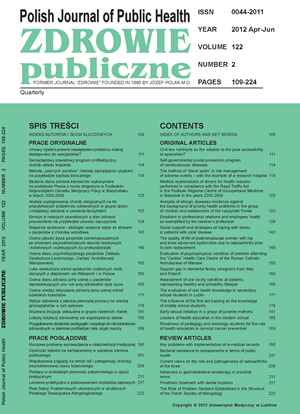Support gap in dementia family caregivers from Italy and Poland
Keywords:
family caregivers, services, dementia, disability, support gapAbstract
Introduction. With the progress of dementia, care needs increase substantially. Lack of adequate care support in community is among the reasons of early institutionalization of demented persons.
Aim. The aim of the study is to compare the “support gap” in the Italian and Polish family caregivers of disabled older persons with probable dementia.
Material and methods. The study was a secondary analysis of the EUROFAMCARE data, limited to the Polish (n=131) and Italian (n=293) caregivers who provided care and support for severely disabled relatives with memory impairment and behavioral disorders. The caregivers indicating a given type of support as very important and simultaneously not being met for them were defined as not provided with caring support, i.e. making a “support gap”.
Results. Regardless of the country, there were significant gaps between the preferred types of support and low use of these care services. The highest gaps referred to informational and organizational support, planning future care, and financial support. The findings confirmed widespread demand for care support among dementia caregivers in both countries; however the size of relevant support gaps differed between countries.
Conclusions. In both countries there is an urgent need for the development of a respite care services for family caregivers, such as a temporary break from caring process. The special needs of family caregivers of demented older people ought to be taken into consideration by health and social care organizers, as well as policy makers in order to lower the care burden and to enhance caregivers’ willingness to continue the care.
References
1. Berr C, Wanata J, Ritchie K. Prevalence of dementia in the elderly in Europe. EurNeuropsychopharmacol. 2005;15:463-71.
2. Luppa M, Luck T, Brähler E, König HH, Riedel-Heller, SG. Prediction of institutionalisation in dementia. Dement Geriatr Cogn Disord. 2008;26:65-78.
3. Gaugler JE, Kane RL, Kane RA., Newcomer, R. Unmet care needs and key outcomes in dementia. J Am Geriatr Soc. 2005;53(12):2098-105.
4. Lamura G, Döhner H, Kofahl C. Eds. Family carers of older people in Europe. A six-country comparative study. Berlin: LIT Verlag; 2008.
5. Keady J, Nolan M. Behavioural and Instrumental Stressors in Dementia (BISID): refocusing the assessment of caregiver need in dementia. J Psychiatr Ment Health Nurs. 1996;3(3):163-72.
6. Mahoney FI, Barthel DW. Functional evaluation: the Barthel Index. Maryland State Med J. 1996;14:61-5.
7. World Health Organization. World Health Organization Info Package: Mastering depression in primary care. Version 2.2. Geneva: WHO; 1998.
8. Brazier JE, Harper R, Jones NM, at al. Validating the SF-36 health survey questionnaire: new outcome measurement for primary care. BMJ.1992;305(6846): 160-4.
9. Fillenbaum GG, Smyer MA. The development, validity and reliability of the OARS multidimensional functional assessment questionnaire. J Gerontol. 1981;36(4):428-34.
10. Alwin J, Öberg B, Krevers B. Support/services among family caregivers of persons with dementia - perceived importance and services received. Int J Geriatr Psych. 2010;25(3):240-8.
11. Schulz R, O’Brien A, Czaja S, et al. Dementia caregiver intervention research: in search of clinical significance. Gerontologist. 2002;42(5): 589-602.
12. Cooke DD, McNally L, Mulligan KT, Harrison MJ, Newman SP. Psychosocial interventions for caregivers of people with dementia: a systematic review. Aging Ment Health. 2001;5(2):120-35.
13. Weinberger M, Gold DT, Divine GW, et al. Expenditures in caring for patients with dementia who live at home. Am J Public Health. 1993;83(3):338-41.
14. Coen RF, O’Boyle CA, Coakley D, Lawlor BA. Individual quality of life factors distinguishing low-burden and high-burden caregivers of dementia patients. Dement Geriatr Cogn Disord. 2002;13(3):164-70.
15. Fung WY, Chien WT. The effectiveness of a mutual support group for family caregivers of a relative with dementia. Arch Psychiatr Nurs. 2002;16(3):134-44.
16. Lamura G, Mnich E, Nolan M, et al. Family carers’ experiences using support services in Europe: empirical evidence from the EUROFAMCARE study. Gerontologist. 2008;48(6):752-71. 17. Brodaty H, Thomson C, Thompson C, Fine M. Why caregivers of people with dementia and memory loss don’t use services. Int J Geriatr Psych. 2005;20(6):537-46


